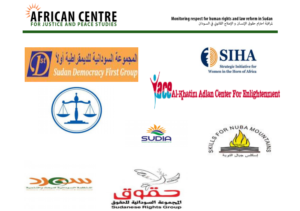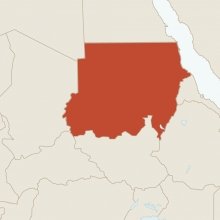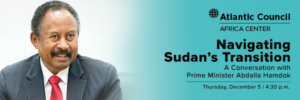The international community must immediately boost its support to Sudan to accelerate its democratic transition, allowing it to sustain peace and accelerate much-need development, said the Head of the United Nations Development Programme (UNDP) as he concluded a three-day visit to Sudan — the first ever by a UNDP Administrator.
“Having met with communities and leaders from across society, I believe that the international community now has a once in a lifetime opportunity to foster lasting peace and democracy which will set the country on a positive development trajectory — including a much stronger economy,” said Achim Steiner. “This means bolstering support to Sudan’s Transitional Government so that it can deliver on the needs and aspirations of its people.”
 A U.S. diplomat’s visit to Sudan this week was seen as a sign of thawing U.S.-Sudanese relations following the military’s ouster of Omar al-Bashir as president last April, VOA adds. Tibor Nagy, U.S. assistant secretary of state for African affairs, said there were still obstacles to Sudan’s securing financial support from the international community, including its continued spot on the U.S. sponsors of terrorism list and the country’s foreign debt, now at $47 billion. Sudanese political analyst Tarig Othman said Nagy’s visit was important, with the government trying to get rid of the accumulated crises the ousted regime left.
A U.S. diplomat’s visit to Sudan this week was seen as a sign of thawing U.S.-Sudanese relations following the military’s ouster of Omar al-Bashir as president last April, VOA adds. Tibor Nagy, U.S. assistant secretary of state for African affairs, said there were still obstacles to Sudan’s securing financial support from the international community, including its continued spot on the U.S. sponsors of terrorism list and the country’s foreign debt, now at $47 billion. Sudanese political analyst Tarig Othman said Nagy’s visit was important, with the government trying to get rid of the accumulated crises the ousted regime left.
Despite the continued presence of elements of Bashir’s old regime, the new government can improve the prospects for democratization if it begins to address at least two issues, analysts Mai Hassan and Ahmed Kodouda asserted in the National Endowment for Democracy’s Journal of Democracy:
- First, the new government must tackle the underlying economic crisis. If Sudan’s economy does not take a turn for the better, the security apparatus may try to thwart civilian rule by arguing that the civilian-led government has proven unable to improve citizens’ livelihoods.
- Second, the transitional government must incorporate Sudan’s traditionally marginalized groups, including those living in the periphery and women, and address these groups’ demands. Doing so would begin the process of closing the deep societal fissures left behind by decades of Bashir’s rule.
 Sudan’s civilian government and a broad cross-section of Sudanese civil society have recently called on the U.S. government to remove Sudan from its State Sponsors of Terrorism list, note The Sentry’s anti-money laundering advisor Hilary Mossberg and co-founder John Prendergast.
Sudan’s civilian government and a broad cross-section of Sudanese civil society have recently called on the U.S. government to remove Sudan from its State Sponsors of Terrorism list, note The Sentry’s anti-money laundering advisor Hilary Mossberg and co-founder John Prendergast.
Many see such a move as the solution to reverse Sudan’s economic implosion, as the transitional government that emerged from last year’s toppling of dictator Omar al-Bashir seeks to move the country towards democracy, they write for Just Security:

NDI
But the process required for delisting is widely misunderstood, the expectations for the results are exaggerated, and, most importantly, the real reforms necessary for economic recovery are grossly underappreciated. There are ways to achieve the goals Sudan’s pro-democracy forces have set for their country, but it will require multiple, methodical steps by both Sudan and the United States.
The Sudanese uprising was the African Story-of-the-Year, because — against all odds — it succeeded, due to the sheer force of will of the Sudanese people, reminding Americans that our greatest export to the world remains our values of democratic freedoms, said K. Riva Levinson, president and CEO of KRL International LLC.
 One year ago, civic action to protest the high cost of living in Sudan, led by the Sudanese Professionals Association (SPA), swelled into the most sustained civilian protest movement in the country’s modern history, she wrote for The Hill:
One year ago, civic action to protest the high cost of living in Sudan, led by the Sudanese Professionals Association (SPA), swelled into the most sustained civilian protest movement in the country’s modern history, she wrote for The Hill:
What ensued in Sudan is part of the rise of the activist generation, a phenomenon that BBC’s Africa Editor Fergal Keane suggests is the most important development in Africa politics in the last two decades. The Armed Conflict Location & Event Data Project (ACLED) recorded 3,791 protests in 2018, compared to 653 demonstrations in 2008. Many factors can impact the outcome of these protest movements, and as the International Crisis Group reminds us, “Sudan’s transition remains fragile and the African Union, the United States, and the European Union, together with the Gulf States must ensure that the power-sharing deal is respected.”
 At a time when the rise of authoritarian states like China and Russia are undermining democratic norms and values, transitional countries like Sudan and Ethiopia represent important opportunities for progress, said NED President Carl Gershman.
At a time when the rise of authoritarian states like China and Russia are undermining democratic norms and values, transitional countries like Sudan and Ethiopia represent important opportunities for progress, said NED President Carl Gershman.
What’s the immediate legacy of the revolution for ordinary Sudanese people? Emmanuelle Veuillet, PhD researcher at Paris’s Panthéon-Sorbonne University and member of the “Social Dynamics of Civil Wars” research group tells France24 (above).
The National Democratic Institute for International Affairs (NDI) seeks a Resident Country Director to oversee the implementation of its democracy and governance programs in Sudan. The ideal candidate should have excellent management skills and extensive experience in providing assistance to executive and legislative branches of government, civil society groups and political parties, particularly related to transitional political environments (HT: Global Jobs).







